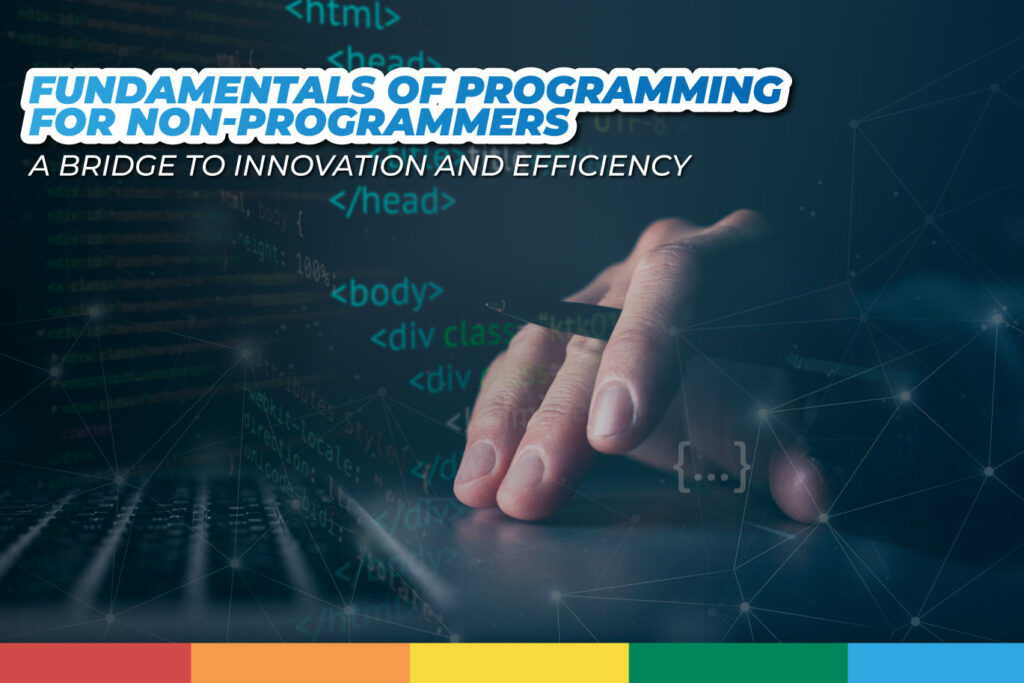Programming has evolved from being an exclusive skill for software engineers to becoming an essential tool across various professional domains. From digital marketing to project management, understanding the basics of programming can transform how we approach problems and find solutions. Here, we will delve into the foundational principles of programming in a detailed and accessible manner, exploring how they can be applied in different professional contexts.
Why Non-Programmers Should Learn Programming?
1. Enhanced Efficiency and Productivity
Understanding programming fundamentals enables the automation of repetitive tasks, saving time and reducing errors. For instance, in digital marketing, scripts can be used to automatically generate data analysis reports or manage advertising campaigns more precisely.
2. Better Understanding of Technology
In an increasingly digital world, understanding how the tools we use daily function allows for more informed decision-making. Basic programming knowledge helps in better evaluating available technologies and collaborating more effectively with technical teams.
3. Fostering Innovation
Programming opens up a realm of creative possibilities. With basic skills, one can develop prototypes of new ideas, create custom tools for specific needs, and experiment with innovative solutions.
Basic Concepts of Programming
1. Programming Languages
There are numerous programming languages, each with its own characteristics and specific uses. Some of the most popular and beginner-friendly ones include:
- Python: Known for its clear and simple syntax, ideal for beginners. Used in data analysis, web development, and task automation.
- JavaScript: The language of the web, allowing for the creation of interactive and dynamic web pages. Essential for frontend development.
- HTML y CSS: Though not programming languages per se, they are crucial for creating web pages. HTML structures content, while CSS handles design and presentation.
2. Algorithms and Programming Logic
An algorithm is a step-by-step set of instructions for solving a problem. Understanding how to design algorithms is essential for any programmer, covering:
- Sequence: The order in which instructions are executed.
- Conditionals: Allowing decisions based on certain conditions (e.g., if-else statements in many languages).
- Loops: Repeating a set of instructions (e.g., for, while loops).
3. Data Structures
Data structures are ways to organize and store data efficiently. Some common ones include:
- Arrays: Collection of elements stored in contiguous memory locations.
- Lists: Similar to arrays but with the ability to dynamically resize.
- Dictionaries: Store key-value pairs, enabling quick data retrieval.
4. Functions and Modules
Functions are reusable code blocks designed to perform a specific task. Modules are collections of functions and other resources that can be imported and used in other programs.
Practical Applications of Programming for Non-Technical Professionals
1. Task Automation
Automating routine processes frees up time for more strategic activities. For example, a marketing professional can write a Python script to gather data from various sources, analyze it, and generate a weekly report.
2. Data Analysis
Data analysis is crucial for making informed decisions. With basic programming knowledge, tools like pandas in Python can be used to manipulate and analyze large volumes of data.
3. Prototyping
For entrepreneurs and product managers, the ability to create rapid prototypes can accelerate the development and validation cycle of new ideas. Tools like JavaScript and frameworks like React allow for building functional user interfaces quickly.
4. Website Enhancement
Knowledge of HTML, CSS, and JavaScript enables making adjustments and improvements to websites without fully relying on developers. This is particularly useful for digital marketers needing to update content, optimize SEO, and enhance user experience.
Resources for Learning Programming
1. Online Platforms
- Coursera: Offers beginner programming courses taught by renowned universities.
- edX: Similar to Coursera, with courses from various academic institutions.
- Codecademy: Ideal for learning by doing, with interactive exercises in various programming languages.
2. Recommended Books
- “Python Crash Course” de Eric Matthes: A practical book for learning Python from scratch.
- “Eloquent JavaScript” de Marijn Haverbeke: A deep dive into JavaScript and web programming.
- “Automate the Boring Stuff with Python” de Al Sweigart: Perfect for learning to automate common tasks.
3. Communities and Forums
- Stack Overflow: A community of programmers where answers to almost any programming question can be found.
- Reddit (r/learnprogramming): A forum where beginners can ask questions and share resources.
- GitHub: While more advanced, exploring projects on GitHub provides practical examples of code structure and writing.
Learning the fundamentals of programming is not only a valuable skill in today’s professional world but also opens the door to greater innovation and efficiency across various domains. From automating tasks to analyzing data and prototyping, programming offers powerful tools to enhance how we work and tackle challenges. By investing time in learning these basics, professionals can better equip themselves to navigate and thrive in an increasingly digital and technologically advanced environment.
For those interested in exploring this path, there are countless resources available that make learning accessible and effective. So why not take the first step today and discover the transformative power of programming?
And if you don’t have the time to learn how to do it yourself, don’t worry! Our programmers are ready to help you innovate and optimize your solutions. Contact us today and discover how we can build your next tech project!







